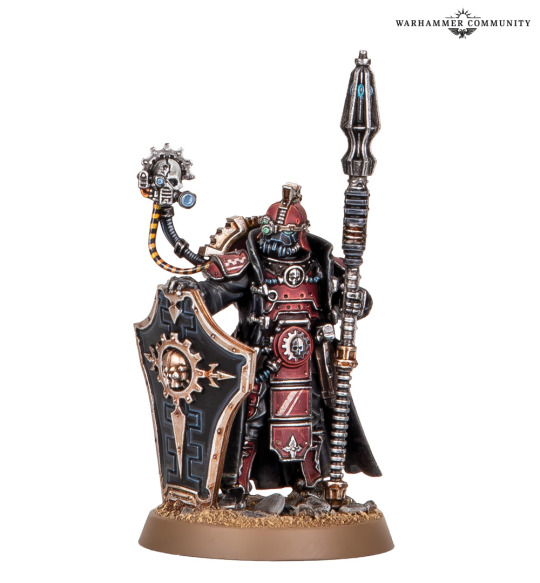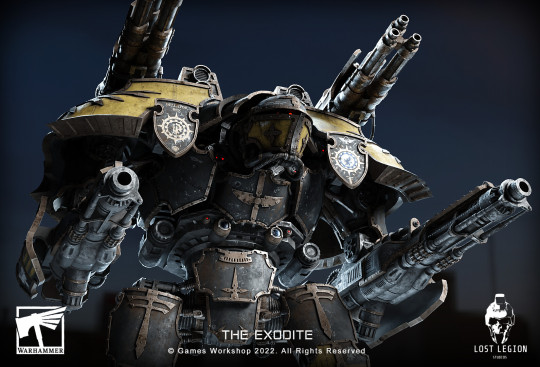#collegia
Explore tagged Tumblr posts
Text


Hey, Skit, are you pretty under all that?
#games workshop#forge world#warhammer 40k#warhammer 30k#age of darkness#adeptus mechanicus#martian mechanicum#mechanicum taghmata#collegia titanica#titan guard#secutarii axiarch#warhammer community
184 notes
·
View notes
Text






























Forces of the Imperium of Man (1/2)
#Warhammer#Warhammer 40000#The Imperium of Man#Imperial Guard#Space Marines#Ultramarines#Blood Angels#Grey Knights#Dark Angels#Raven Guard#Space Wolves#Black Templars#Deathwatch#Death Watch#Sisters of Battle#Adeptus Mechanicus#Skitarii#Imperial Knights#Adeptus Custodes#Sisters of Silence#Inquisition#Rogue Traders#Imperial Navy#Adeptus Arbites#Enforcers#Collegia Titanica#Officio Assassinorum
42 notes
·
View notes
Text



Warlord Battle Titan - The Exodite by Joazzz
43 notes
·
View notes
Note
I’m sure you’ve heard this but there’s going to be a 3 season prequel to Gomorra about Pietro and Imma that takes place in the ‘70s. It feels kind of gimmicky and cynical (like Many Saints of Newark) but I will be seated.
See, I think the writers aren't cynical and gimmicky enough, they need to lean in and prequel harder. Picture this: in 79 AD, Vesuvius blows and one of Pliny’s quadriremes crosses the Bay of Neapolis from Stabiae with the last handful of survivors, among whom is an infant found in the arms of his dead mother. The baby, having survived Vulcan's wrath, is left on the steps of the Temple of Mars Ultor. 25 years later, in Neapolis, Cyrus is a manumitted slave who maintains a working relationship with his old master via clientela—his master being the magistrate of a corrupt merchant collegium, Petrus Savastanus—as well as a funusual situationship with Petrus’ son, Januarius, a young profligate more interested in spectacles and debauchery than leadership.
#guesstimating here but flavian-era civil collegia in a port city like naples would have been very…organized crimey#corrupt if you will.#in any case i too will be seated but having no loyalty i will throw myself overboard if it sucks#anonymous#assbox#gomorrah
10 notes
·
View notes
Text
Russia. Saint Petersburg. The Twelve Collegia building and Palace of Emperor Peter the Second Санкт-Петербург. Здание Двенадцати коллегий и Дворец Императора Петра Второго
#2016#city#july#museum#neva river#palace of emperor peter the second in saint petersburg#river#russia#saint petersburg#summer#twelve collegia#город#здание двенадцати коллегий#июль#лето#музей#нева#питер#река#россия#санкт-петербург#flickr#russian tumblr#русский tumblr
5 notes
·
View notes
Text
DAILY FACT #19: The Collegia Titanica are a divison of the Adeptus Mechanicus that focuses on the repair, construction, and crewing of the imperial Titans from the time of the Horus Hersey. Titans themselves are massive warmachines that are some of the Imperium's most dangerous and powerful weapons of destruction. They are manned by large amounts of warriors and pliots truly showing the might and technical prowess of the Adeptus Mechanicus.

6 notes
·
View notes
Text
Terrible in their beauty, the embodiment of the Omnissiah, the Titans are the largest and most complex fighting machines of the Imperium. They are different, but one thing remains unchanged - colossal firepower, which can have a decisive influence on the outcome of the battle
I really liked the idea of a ghostly outline of titans and their height comparison. And this will turn out to be such a poster

10 notes
·
View notes
Text
The roll of emotions:
James Workshop finally added the Collegia Titanica to Legions Imperialis as a faction. Full Titan army? Hell yeah. I love my biggest bois, and it's cool that the whole 70/30 rule isn't an issue.
However, just like nearly every army I have ever selected, there is a big catch.
Formations do nothing...
According to Goohammer, the formations tell you what Titans you can take and that's it. No reason to take one formation over another besides what Titans they allow you to bring.
Big ol' bummer. I know I can still play them, but it sucks to see a faction you really want to play without extra nuances that other factions have.
1 note
·
View note
Text
youtube
Was listening to this song while reading Carol Berg’s the Soul Mirror and it seemed a perfect fit for the mood and the relationship between Dante and… well and everyone really.
0 notes
Text

The Reaver has been delivered, bringing another Titan build to a close. Total time spent, 64 days.
#games workshop#forge world#warhammer 40k#collegia titanica#chaos#chaos reaver titan#commission#delivered
67 notes
·
View notes
Text
“Gold, frankenscense and myrrh are the three jewels of the God Osiris in the ancient Egyptian tradition. Every Pharoah was buried with these three things. The birth of Jesus was visited by the three wise men following the star, which was really the three stars of Orion's belt, and Orion was Osiris in the Egyptian tradition. All three substances had value- gold for its inherent value and that it can be converted to manna; frankincense as an insence that kept away harmful bacteria; myrrh as a medical sedative. The Stars of Orion's belt point to where the sun will rise, among other things. Osiris was said to have been born at the same date as Jesus, and Jesus borrowed much from the Egyptian tradition.” - Timothy Hogan
15 notes
·
View notes
Text
question
#warhammer 40k#ave omnissiah#space marines#admech#astra militarum#adepta sororitas#imperial knight#chaos space marines#leagues of votann#tyranids#genestealers#eldar#ork#tau#necrons#GDO that's a lotta tags
331 notes
·
View notes
Text

Stranded Warlord Titan by Oliver Wetter
145 notes
·
View notes
Note
how do ml's reconcile with lenin going for a bigbrainhaver hierarchy which just so happened to place him at the tippy top? most of the things he's quoted for writing make a kind of sense in that longwinded academic philosopher way, but, like, russia went from having a revolution against monarchy to having a monarchy, essentially, and what folks do tends to align with their desires, yeah? wouldn't that make everything he said, idk, suspicious?
we reconcile with this because none of this is even remotely true. lenin did not 'happen to be placed at the tippy top' but was in fact elected by the soviets, who worked in a very simple electoral system by which workers and peasants would elect representatives to their local soviet, who as well as administering local services would also elect members to higher bodies. the quote unquote bigbrainhaver hierarchy system in question was as follows:
The sovereign body is in every case the Congress of Soviets. Each county sends its delegates. These are elected indirectly by the town and county Soviets which vote in proportion to population, following the ratio observed throughout, by which the voters in the town have five times the voting strength of the inhabitants of the villages, an advantage which may, as we saw, be in reality three to one. The Congress meets, as a rule, once a year, for about ten days. It is not, in the real sense of the word, the legislative body. It debates policy broadly, and passes resolutions which lay down the general principles to be followed in legislation. The atmosphere of its sittings is that of a great public demonstration. The Union Congress, for example, which has some fifteen hundred members, meets in the Moscow Opera House. The stage is occupied by the leaders and the heads of the administration, and speeches are apt to be big oratorical efforts. The real legislative body is the so-called Central Executive Committee (known as the C. I. K. and pronounced "tseek") . It meets more frequently than the Congress to which it is responsible-in the case of the Union, at least three times in the year-passes the Budget, receives the reports of the Commissars (ministers), and discusses international policy. It, in its turn, elects two standing bodies: (1) The Presidium of twenty-one members, which has the right to legislate in the intervals between the sittings of the superior assemblies, and also transacts some administrative work. (2) The Council of Peoples' Commissars. These correspond roughly to the Ministers or Secretaries of State in democratic countries and are the chiefs of the administration. Meeting as a Council, they have larger powers than any Cabinet, for they may pass emergency legislation and issue decrees which have all the force of legislation. Save in cases of urgency, however, their decrees and drafts of legislation must be ratified by the Executive Committee (C.I.K.). In another respect they differ from the European conception of a Minister. Each Commissar is in reality the chairman of a small board of colleagues, who are his advisers. These advisory boards, or collegia, meet very frequently (it may even be daily) to discuss current business, and any member of a board has the right to appeal to the whole Council of Commissars against a decision of the Commissar.
—H.N. Brailsford, How The Soviets Work (1927)
you might notice that the congresses of soviets were not directly elected -- this is because they were elected by local soviets, who were directly elected, in a process that many people have given first hand accounts of:
I have, while working in the Soviet Union, participated in an election. I, too, had a right to vote, as I was a working member of the community, and nationality and citizenship are no bar to electoral rights. The procedure was extremely simple. A general meeting of all the workers in our organisation was called by the trade union committee, candidates were discussed, and a vote was taken by show of hands. Anybody present had the right to propose a candidate, and the one who was elected was not personally a member of the Party. In considering the claims of the candidates their past activities were discussed, they themselves had to answer questions as to their qualifications, anybody could express an opinion, for or against them, and the basis of all the discussion was: What justification had the candidates to represent their comrades on the local Soviet. As far as the elections in the villages were concerned, these took place at open village meetings, all peasants of voting age, other than those who employed labour, having the right to vote and to stand for election. As in the towns, any organisation or individual could put forward candidates, anyone could ask the candidate questions, and anybody could support or oppose the candidature. It is usual for the Communist Party to put forward a candidate, trade unions and other organisations can also do so, and there is nothing to prevent the Party’s candidate from not being elected, if he has not sufficient prestige among the voters. In the towns the “ electoral district ” has hitherto consisted of a factory, or a group of small factories sufficient to form a constituency. But there was one section of the town population which has always had to vote geographically, since they did not work together in one organisation. This was the housewives. As a result, the housewives met separately in each district, had their own constituencies, and elected their own representatives to the Soviet. Here, too, vital interest has always been shown in the personality of every candidate. Why should this woman be elected ? What right had she to represent her fellow housewives on the local Soviet ? In the district next to my own at the last election the housewife who was elected was well known as an organiser of a communal dining-room in the district. This was the kind of person that the housewives wanted to represent them on the Soviet. Another candidate, a Communist, proposed by the local organisation of the Party, was turned down in her favour.
[...]
The election of delegates to the local Soviet is not the only function of voters in the Soviet Union. It is not a question here of various parties presenting candidates to the electorate, each with his own policy to offer. The Soviet electorate has to select a personality from its midst to represent it, and instruct this person in the policy which is to be followed when elected. At a Soviet election meeting, therefore, as much or more time may be spent on discussion of the instructions to the delegate as is spent on discussing the personality of the candidates. At the last election to the Soviets, in which I personally participated, we must have spent three or four times as much time on the working out of instructions as we did on the selection of our candidate. About three weeks before the election was to take place the trade union secretary in every department of our organisation was told by the committee that it was time to start to prepare our instructions to the delegate. Every worker was asked to make suggestions concerning policy which he felt should be brought to the notice of the new personnel of the Moscow Soviet. As a result, about forty proposals concerning the general government of Moscow were handed in from a group of about twenty people. We then held a meeting in our department at which we discussed the proposals, and adopted some and rejected others. We then handed our list of pro¬ posals to a commission, appointed by the trade union committee, and representing all the workers in our organisation. This Commission co-ordinated the pro¬ posals received, placed them in order according to the various departments of the Soviet, and this co-ordinated list was read at the election meeting itself, again discussed, and adopted in its final form.
—Pat Sloan, Soviet Democracy (1937)
Between the elections of 1931 and 1934, no less than 18 per cent of the city deputies and 37 per cent of village deputies were recalled, of whom only a relatively small number — 4 per cent of the total — were charged with serious abuse of power. The chief reasons for recall were inactivity — 37 per cent — and inefficiency — 21 per cent. If these figures indicate certain lacks in the quality of elected officials, they show considerable activity of the people in improving government. The electorate of the Peasants' Gazette, for example, consisted of some 1,500 employees, entitled to elect one deputy to the Moscow city soviet and two to the ward soviet. For more than a month before the election every department of the newspaper held meetings discussing both candidates and instructions. Forty-three suggested candidates and some 1,400 proposals for the work of the incoming government resulted from these meetings, which also elected committees to boil down and classify the instructions. These committees issued a special four-page newspaper for the 1,500 voters; it contained brief biographies of the forty-three candidates, an analysis of their capacities by the Communist Party organization of the Peasants' Gazette, and the "nakaz," or list of "people's instructions," classified by subject and the branch of government which they concerned. At the final election meeting of the Peasants* Gazette there was literally more than 100 per cent attendance, since some of the staff who for reasons of absence or illness had not been listed as prospective voters returned from sanatoria or from distant assignments to vote. The instructions issued by the electorate in this manner — 1,400 from the Peasants' Gazette and tens of thousands from Moscow citizens — became the first business of the incoming government.
—Anna Louise Strong, The New Soviet Constitution (1937)
does this mean that the soviet project was some utopian perfect system? no. there were flaws in the system like any other. it disenfranchised the rural peasantry (although not, i would like to add, to any extent greater or even equivalent to the extent to which the US electoral system disenfranchises the urban working class) -- the various tiers of indirect selection created a divide between the average worker and the highest tier of the executive -- and various elements of this fledgling system would calcify and bureaucratise over time in ways that obstructed worker's democracy. but saying that it was 'a monarchy' is founded in absolutely nothing except the most hysterical anticommunist propaganda and tedious orwellian liberal truisms.
even brailsford, in an account overall critical of the soviet system, had to admit:
Speaking broadly, the various organs of the system, from the Council of Commissars of the Union down to the sub-committees of a town Soviet, are handling the same problems. Whether one sits in the Kremlin at a meeting of the most august body of the whole Union, the "C.I.K.," or round a table in Vladimir with the working men who constitute its County Executive Committee, one hears exactly the same problems discussed. How, be-fore June arrives, shall we manage to reduce prices by ten percent? What growth can we show in the number of our spindles, or factories, and in the number of workers employed? When and how shall we make our final assault on the last relics of illiteracy? Or when shall we have room in our schools, even in the remotest village, for every child? Was it by good luck or good guidance that the number of typhus cases has dropped in a year by half? And, finally, how can we hasten the raising of clover seed, so that the peasants who, at last, thanks to our propaganda, are clamoring for it, may not be disappointed?
—H.N. Brailsford, How The Soviets Work (1927)
genuinely, i think you should take a moment and think about where you learned about the soviet union. have you read any serious historical work on the topic, even from non-communist or anti-communist sources? because even imperialist propagandists have to make a pretence at engaging with actual facts on the ground, something which you haven't done at all -- and yet you speak with astounding confidence. i recommend you read some serious books instead of animal farm and reflect on why you believe the things you believe and how you know the things you think you know.
1K notes
·
View notes
Text
Also, until very recently Tau were screwed the moment a Titan Legion was deployed against them
youtube
youtube
They're tiny, feeble, primitive Xeno minds couldn't even fathom the concept of anyone building weapons on that scale!
To quote this Imperial diplomat:
youtube

284 notes
·
View notes

